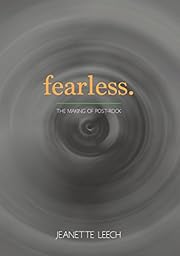Well, you need this book -

Wire magazine said -
Nearly a quarter of a century after its initial critical conception and media blitz, post-rock remains an elusive beast. It’s also a term that few of its alleged purveyors even accept; in fact, many treat it with contempt.
Despite these dilemmas, Jeanette Leech boldly and thoroughly examines the diverse sprawl of musicians who could be considered adherents of this contentious genre. If you’re old enough to have lived through post-rock’s emergence as a cultural-critical phenomenon,
Fearless: The Making Of Post-Rock will trigger many fond memories of groups that found fresh ways to rearrange rock’s moribund DNA.
Leech’s remit here is expansive and her view granular. She follows a relatively straightforward chronological survey of the genre’s most interesting progenitors and its most adventurous practitioners, although she reserves the last two chapters to lament post-rock’s blanding out phase and subsequent commercial success. Spoiler alert: Radiohead and Sigur Rós fans will not be pleased with Leech’s withering observations about their widescreen bathos and nature documentary-friendly epics.
Elaborating on foundational writings by Simon Reynolds in Mojo, Melody Maker and The Wire, Leech finds connections among a vast network of stylistically diverse musicians who strive to shake free from – or shatter – rock’s decades-old habits. She scrutinises the approaches of
Bark Psychosis, Disco Inferno,
Tortoise, Moonshake/Laika, Seefeel,
Godspeed You! Black Emperor and many others, relating vivid details of their creative processes. In retrospect, the first wave of post-rock seems like the last substantial innovation that’s occurred in a musical form now pushing 70. That makes the timing of Fearless optimal for a nostalgic revisiting of this music.
The historical perspective displayed in Fearless is impressive. Leech cites, among others, The Velvet Underground, Red
Krayola,
Can,
Eno, PiL, Swans, Ut,
Cocteau Twins, My Bloody Valentine,
Talk Talk, AR Kane and
Slint, plus free jazz, minimalism, dub, ambient, American primitive, no wave and sample-heavy hiphop like Public Enemy, as essential precursors to what would later be deemed post-rock. Ringing a false note is a reference to The Police as proto-postrock, based on a quote from a member of Hangedup. The Police had some good songs, but come on.
Key nodes of post-rock creativity like the Too Pure,
Constellation and
Kranky labels, the Bristol/Flying Saucer Attack axis, Chicago’s
Tortoise diaspora, Louisville’s post-Slint action and the slowcore (anti) movement receive ample explication and input from the people who fostered these idiosyncratic and influential sounds.
Through a sheer dogged accumulation of keen critiques and shrewd dot-connecting, Leech constructs a multi-hued mosaic of sonic outliers finding their way out of the morass of rock tradition. Her description of Main is particularly piquant: “Main’s conscious project to dissolve the guitar suggested that post-rock really had fulfilled a sort of evolutionary destiny; that it wasn’t a genre tag with a definable sound but a way to hasten rock’s extinction.” It’s an inspirational tale, especially viewed through 2017 lenses.
While Leech’s view of post-rock embraces an eclectic array of musicians – including Techno Animal, Young Gods, Boards Of Canada and Matmos – Fearless did have some curious omissions. To name a few: Boredoms, Hovercraft and
To Rococo Rot. In fact, most of the figures Leech examines hail from the UK, Canada and the US, which may simply be an interview accessibility issue. A writer can’t cover everything on a given topic, of course, but the dearth of non-Anglo/non-American groups is somewhat baffling. However, this is a quibble. Ultimately, Leech offers acute analysis and revealing insights gleaned from several interviews and research, making Fearless a valuable reference book on a relatively overlooked subject that still rivets the imagination.
Oh and yes, I am currently reading this book.




